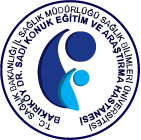ABSTRACT
Conclusion:
In patient with renal scarring, for using urine MIF levels as a biochemical marker, more prospective studies are needed on this subject.
Results:
Urine MIF levels were statistically significantly high in renal scar group than without scar group (p<0.001), the average levels of urine MIF in scar group was 331,14 ± 256,20 (254,85) than those in patients without scar 195,30±298,68 (111,55) MIF/creatinine levels were not statistically significant between groups (p>0.05).
Material and methods:
Eighty eight children with renal scarring due to recurrent urinary tract infection were included. Dimercaptosuccinic acid (DMSA) scintigraphy revealed renal scarring in 44 of them. Macrophage migration inhibitory factor were analyzed by ELISA from the urine samples in both groups.
Objective:
Macrophage migration inhibitory factor (MIF) is a pleiotropic proinflammatory cytokine that plays an important role in several disease including sepsis, pneumonia, diabetes, rheumatoid arthritis, inflammatory bowel disease and cancer. In this study, our aim was to examine the levels of macrophage migration inhibitory factor in children with renal scarring due to recurrent urinary tract infection.



